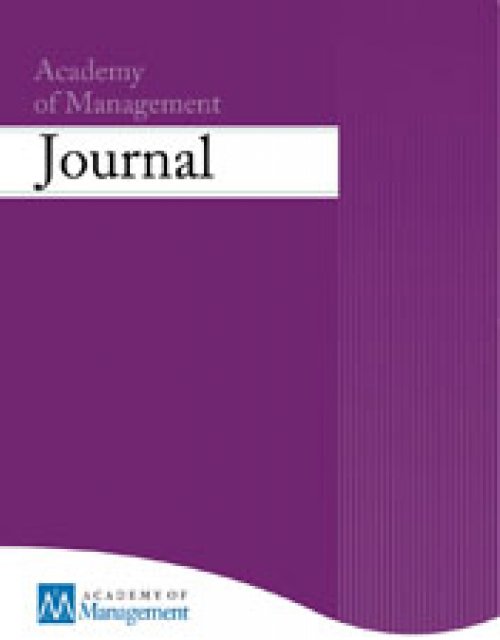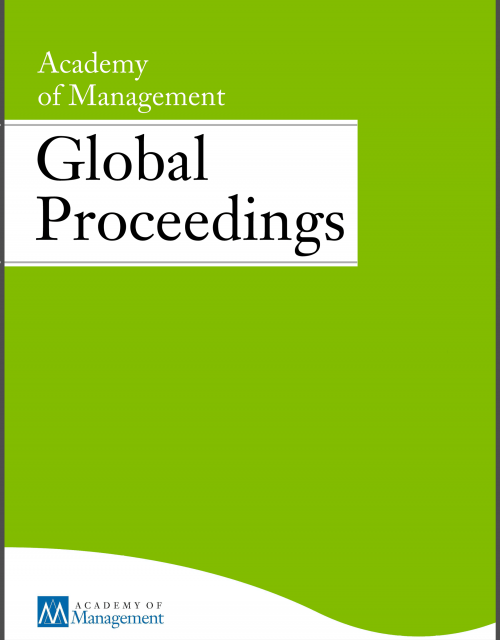Publication records
Subject(s)
Strategy and general management; Technology, R&D management
Keyword(s)
Inventor mobility, alliance formation, interfirm collaboration, technological capabilities, pharmaceuticals
We link the hiring of R&D scientists from industry competitors to the subsequent formation of collaborative agreements, namely technology-oriented alliances. By transferring technological knowledge as well as cognitive elements to the hiring firm, mobile inventors foster the alignment of decision frames applied by potential alliance partners in the process of alliance formation thereby making collaboration more likely. Using data on inventor mobility and alliance formation amongst 42 global pharmaceutical firms over 16 years, we show that inventor mobility is positively associated with the likelihood of alliance formation in periods following inventor movements. This relationship becomes more pronounced if these employees bring additional knowledge about their prior firm’s technological capabilities and for alliances aimed at technology development rather than for agreements related to technology transfer. It is weakened, however, if the focal firm is already familiar with the competitor’s technological capabilities. By revealing these relationships, our study contributes to research on alliance formation, employee mobility, and organizational frames.
With permission of the Academy of Management
Volume
61
Journal Pages
2026–2052
Subject(s)
Human resources management/organizational behavior
Keyword(s)
Startup, scale-up, challenges
We examine the role of career preferences, ability, and structural constraints in explaining first-time employment in startups or established firms. Using panel data on 2,243 U.S. science and engineering PhDs observed before and after entering the job market, we find that ex ante career preferences significantly explain who joins a startup, while ability plays a limited role. Many individuals who prefer to join startups prior to graduation take jobs in established firms, in part due to the limited availability of startup jobs and visa constraints. Interestingly, these individuals are more likely to leave their first position in established firms jobs to join a startup later in time. We discuss implications for founders, managers in established firms, as well as for future research and policy makers.
With permission of the Academy of Management
Volume
Tel Aviv
ISSN (Print)
2638-4892
Subject(s)
Economics, politics and business environment; Information technology and systems; Technology, R&D management
Keyword(s)
Internet access market, access regulation, investment, infrastructure, Next Generation Networks, broadband, telecom, cable operators and EU regulatory framework
JEL Code(s)
L96, L51
In this paper, we study how the coexistence of access regulations for legacy (copper) and fiber networks shapes the incentives to invest in fiber-based network infrastructures. To this end, we first develop a theoretical model that extends the existing literature by, among other things, considering alternative firms with proprietary legacy network (e.g., cable operators) and the presence of asymmetric mandated access to networks. In the empirical part, we test the theoretical predictions using a novel panel data from 27 EU member states pertaining to the last decade. Our main finding is that, in line with the theoretical results, stricter access regulations (i.e., a decrease in access price to legacy network and the adoption of fiber regulation) decrease the incumbent operators’ fiber investments. The estimated magnitude of these effects is economically significant. On the other hand, cable operators, who are responsible for the largest share of investments in fiber, are not affected by access regulation. Our paper thus provides policy insights for the on-going revision of the EU regulation framework for the electronic communications industry.
With permission of Elsevier
Volume
61
Journal Pages
613–652
Subject(s)
Ethics and social responsibility
Keyword(s)
Sustainability, real estate, environment, stakeholder theory
Journal Pages
85–88
Subject(s)
Ethics and social responsibility
Keyword(s)
Energy industry, entrepreneurship, innovation
Journal Pages
81–84
Subject(s)
Information technology and systems
Keyword(s)
Moving target defense, attack simulation, attack graphs, network
modeling
Secondary Title
Secure IT systems
Edition
1st ed.,
Pages
236–254
Subject(s)
Entrepreneurship; Human resources management/organizational behavior; Information technology and systems; Management sciences, decision sciences and quantitative methods; Marketing; Product and operations management; Strategy and general management; Technology, R&D management
Keyword(s)
Hidden Champions, digital transformation, digitalization, customer, disruption, challenges, digital experts, IT specialists, innovation, agile thinking
In this joint study, the Hidden Champions Institute (HCI) of ESMT Berlin and IDG Research Services look into the question of whether the hidden champions are leading the digital transformation of the German economy. More precisely, the study compares the digital transformation among hidden champions to other companies and analyzes their challenges. The result shows that the German hidden champions take the digital revolution seriously and are working vigorously on positioning themselves more digitally, both regarding internal processes and in relation to new business models. In the process, they are considerably quicker and more successful than many small and medium-sized enterprises (SMEs) that are not market leaders. However, in comparison to large corporates, the digital transformation of the hidden champions frequently lags behind, requiring them to learn from companies within their own ranks that are among the global leaders in the digital transformation. There are indeed such “hidden digital champions”, as the study shows.
With permission of IDG Business Media
German edition of the study: Hidden Champions - Champions der digitalen Transformation?.
Pages
32
Subject(s)
Economics, politics and business environment; Information technology and systems; Technology, R&D management
Keyword(s)
Blockchain, distributed ledger, strategy, policy, innovation
In its 2018 coalition agreement, the German federal government has set itself the goal of adopting a "Blockchain strategy" in this legislative period. As part of the planned promotion of Distributed Ledger and Blockchain technologies, the government wants to create a framework for the development and application of these technologies and test them in public administration. The Federal Ministry of Economics and Energy and the Federal Ministry of Finance are jointly in charge of developing the strategy.
On this occasion, in a workshop on 3 July 2018 at the Digital Society Institute of ESMT Berlin, 35 experts from politics, business and science discussed how a national blockchain strategy can be practically organized.
The discussion focused on the questions of what goals such a strategy should have, what the central enablers and appropriate framework conditions for the development and application of Distributed Ledger technologies such as blockchain can be in Germany, and what role the state plays in promoting the technology and managing risks in this technology field.
Sarah Basic and André Eid (Federal Ministry for Economic Affairs and Energy), Dr. Christian Hampel (Ernst & Young GmbH), Dr. Jürgen Kohr (Fujitsu), Dr. Manfred Lochter (Federal Office for Security in Information Technology) and Kai Wagner (Jolocom) gave input speeches to the debate.
Based on the workshop discussion, this paper outlines requirements for a national blockchain strategy.
[Die Bundesregierung hat sich in ihrem Koalitionsvertrag das Ziel gesetzt, in dieser Legislaturperiode eine „Blockchain-Strategie“ zu verabschieden. Im Rahmen der geplanten Förderung von Distributed Ledger und Blockchain Technologien sollen die Rahmenbedingungen für Entwicklung und Einsatz der Technologien verbessert und diese auch in der öffentlichen Verwaltung erprobt werden. Mit der Erarbeitung der Strategie sind federführend das Bundesministerium für Wirtschaft und Energie (BMWi) und das Bundesministerium der Finanzen (BMF) betraut.
Aus diesem Anlass erörterten in einem Workshop am 3. Juli 2018 am Digital Society Institute der ESMT Berlin 35 Experten aus Politik, Wirtschaft und Wissenschaft, wie eine nationale Blockchain-Strategie praktisch organisiert sein kann.
Im Zentrum der Diskussion standen die Fragen, welche Ziele eine solche Strategie haben sollte, was zentrale Ermöglicher und geeignete Rahmenbedingungen für die Entwicklung und Anwendung von Distributed Ledger Technologien wie Blockchain in Deutschland sein können, und welche Rolle dem Staat bei der Förderung und Bekämpfung von Risiken in diesem Technologiefeld zukommt.
Impulsvorträge für die Diskussion hielten Sarah Basic und André Eid (Bundesministerium für Wirtschaft und Energie), Dr. Christian Hampel (Ernst & Young GmbH), Dr. Jürgen Kohr (Fujitsu), Dr. Manfred Lochter (Bundesamt für Sicherheit in der Informationstechnik) und Kai Wagner (Jolocom).
Auf der Grundlage der Workshop-Diskussion skizziert dieses Papier Anforderungen an eine nationale Blockchain-Strategie.]
Pages
14
Subject(s)
Economics, politics and business environment; Finance, accounting and corporate governance
Keyword(s)
Credit shocks, financial crisis, labor demand, employment, wages
JEL Code(s)
D92, G01, G21, J23, J31
We study the impact of exogenous funding shocks to German savings banks during the U.S. subprime mortgage crisis on the labor decisions of 30,000+ private and public firms in Germany. We find that firms with credit relationships with affected banks experience a significant decline in labor demand relative to firms with credit relationships with healthy banks, manifested in a simultaneous reduction in firm‐level employment and average wages. The employment effect is more pronounced in larger firms, while the wage effect is stronger in smaller firms. Both employment and wages go back to pre‐shock levels three years after the shock.
With permission of Elsevier
Volume
36
Journal Pages
16–27
Subject(s)
Strategy and general management
Keyword(s)
Status, competition, tournaments
Merton often envisioned status growth as a process of stepping across a boundary between one status grade and another more elite status grade. Such boundaries include the border between graduate school and a top academic department that young researchers try to traverse, or the frontier between scientists outside the French Academy and scientists inside the French Academy. As it is now common to measure status continuously using network data, the behavioral ramifications of status boundaries have been understudied in recent research. In this essay, we focus on competitive behaviors that emerge near a status boundary because of the desirability - as well as the “double injustice” - of the Matthew effect. Offering insights for future research, we discuss how these competitive behaviors are likely to delay, or even derail, status growth for those who are near a status boundary.
With permission of SAGE Publishing
Volume
27
Journal Pages
378–381
ISSN (Online)
15526542
ISSN (Print)
10564926


